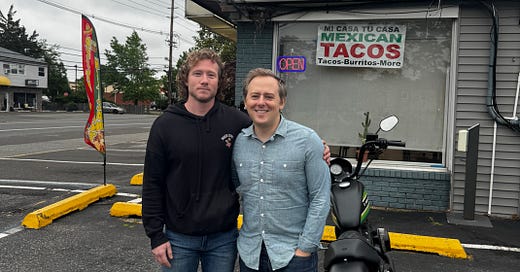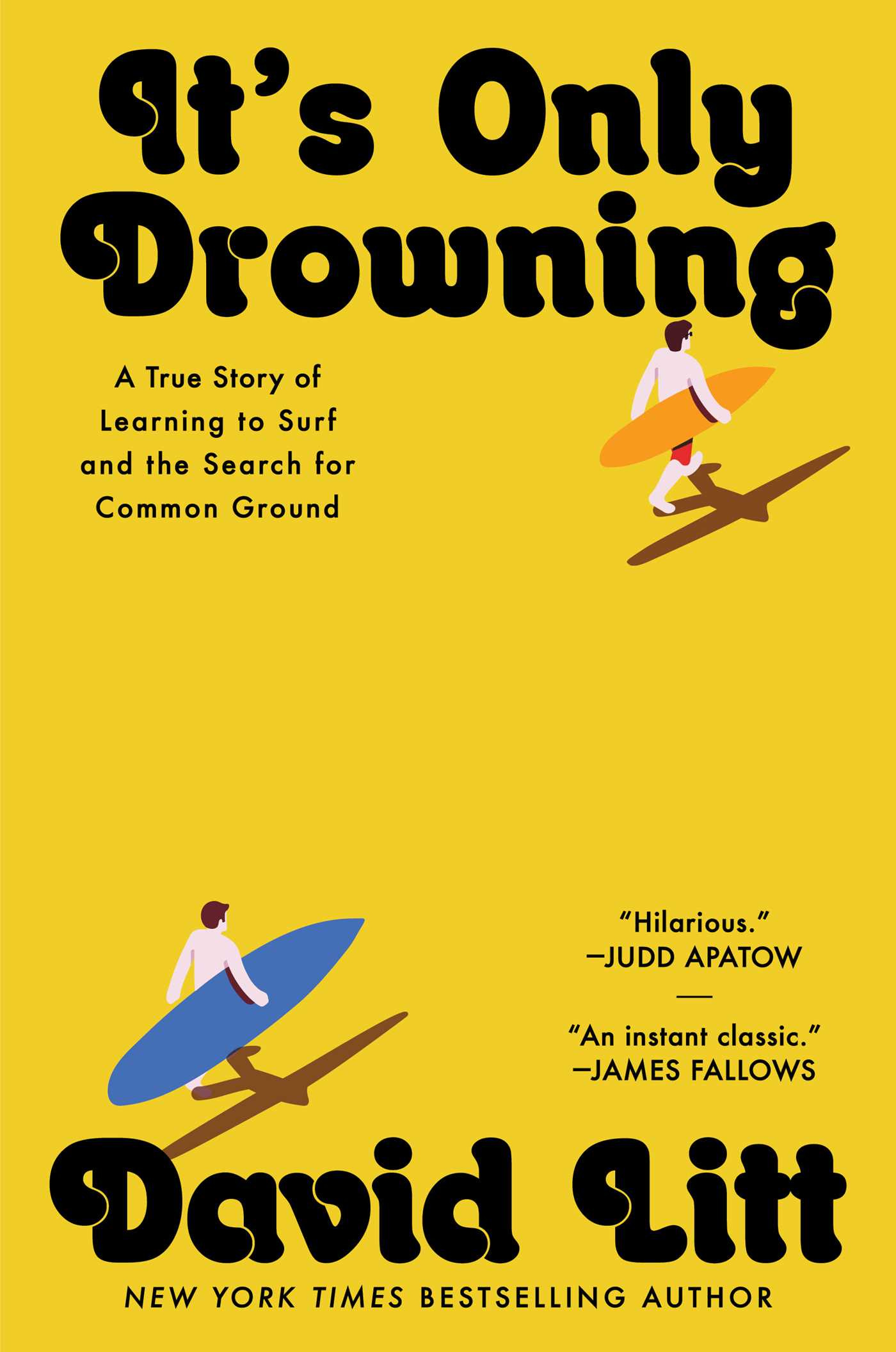The power of unlikely friendship
An excerpt from a new book by former Obama speechwriter David Litt
“It’s Only Drowning: A True Story of Learning to Surf and the Search for Common Ground” is a new memoir about David Litt, a former Obama speechwriter, learning to surf with his brother-in-law, Matt—a tattooed, truck-driving, Joe Rogan superfan. The book was published Tuesday. In this adapted excerpt, David and Matt discover that friendship across fault lines is even harder than it first appears.
One afternoon in 2023, as my wife, Jacqui, sat on the couch writing a memo, I traipsed through the living room in a skintight neoprene wetsuit.
“Matt and I are heading to the beach,” I announced.
She looked up. “So, are you and my brother . . . friends now?”
“Well,” I replied carefully. “We’re not not.”
The look Jacqui gave me wasn’t disapproving, just flabbergasted. I couldn’t blame her. Matt and I had never had anything in common. He had well over a dozen tattoos; I had well over a dozen neckties. I used to write speeches and jokes for President Obama; Matt was Joe Rogan’s biggest fan. As an electrician, he faced the constant prospect of violent shocks, yet never seemed to worry about it. As an author, I faced the occasional prospect of carpal tunnel and worried constantly.
During the pandemic, the issue of vaccination had pushed us further apart than ever. We’d barely been on speaking terms. But in 2022, in Asbury Park, New Jersey, I’d started surfing at the advanced age of 35. I needed a fellow surfer who could help me achieve my goal of riding waves on Hawaii’s famously dangerous North Shore – and Matt was the only fellow surfer I knew.
I still found talking about friendship with another man embarrassing, like chatting about a crush in eighth grade. But ever since Matt and I had returned to the Jersey Shore after a surf trip in Santa Cruz, California, it felt like we’d signed a treaty:
If he was free, and I was free, and conditions were halfway decent, we’d paddle out.
At the end of June, two tropical storms, Bret and Cindy, began tracking north toward Jersey. One early evening, Matt called me after work.
“Could be decent. Let’s try Spring Lake.”
For the first time I could remember, I arrived fifteen minutes ahead of him, so before throwing on my wetsuit I checked the waves. They were pretty big. They weren’t good. Bret and Cindy were still hundreds of miles to the south, and the ocean frothed in anticipation of their arrival. Water sloshed in strange directions. Chest-high peaks were difficult to tell apart.
“I might check Belmar and see if it’s better.” I said to Matt on the phone. “What do you think?”
“Sure. Give it a shot.”
Curious, I noted, a field researcher of myself. You feel the need to ask for his permission before scouting somewhere else. I hadn’t doubted my assessment of the conditions. I’d been surfing for a year; I knew garbage waves when I saw them. But while Matt and I had never discussed the details of our tacit agreement—that’s what made it tacit—his having final say over surf spots seemed like a key provision.
For all the progress I’d made, the ocean, and New Jersey’s ocean in particular, remained his turf.
Matt arrived in Belmar an hour before sunset. He jumped down from his blue Dodge Ram and we ambled together to the boardwalk. While conditions in Belmar weren’t perfect—a current pulled north, and peaks burst from the seafloor like geysers—I was confident it was a big improvement from Spring Lake.
“Looks . . . interesting,” I said, not wanting to state a strong opinion until I knew his.
“Looks good,” he said. We paddled out.
Almost immediately, a breaking wave came out of nowhere, and Matt caught it and leapt to his feet. For a few seconds I couldn’t see him, and when I finally did, he was far down the beach. He paddled back in what seemed like seconds and was soon on another screaming wave that broke in the opposite direction. Then, as though attached to a giant windshield wiper, he did the whole thing again.
I didn’t do so badly myself. Pulling against the current, aiming for the breaking pocket the way Matt had taught me to in Santa Cruz, I caught several shifty peaks.
It was one of the longest days of the year, and I had just started to think about dinner when the first raindrop rippled against the ocean. I was facing seaward, toward a cloudless horizon. But the moment I looked back at land, my breath caught in my chest. The sky over Spring Lake had gone dark. A single, massive cloud, as water-dense and rageful as the Atlantic on which I floated, rolled toward us. A flash split the air. As I’d learned to do in summer camp, I began counting Mississippis. At six Mississippi, the thunder bellowed.
How many Mississippis are there to a mile? One? Three? Five? It was one of those facts I would have sworn I’d known until the moment it became relevant.
I looked frantically for Matt. It was unlikely he hadn’t seen the lightning. It was impossible he hadn’t heard the thunder. But when I spotted him twenty yards away, he was paddling through the impact zone, his expression completely unconcerned. He hopped on one pitchy wave, then another. When a third wave sent him flying in my direction, I tracked him down.
“Hey! Don’t you think we should go in?” I had to yell to be heard above the driving rain.
“Nah,” he yelled back. “I don’t think it’ll hit us.”
It felt like our clashes over the vaccine all over again. I thought I was being safe – he thought I was being a wimp. He offered no evidence to support his opinion, and didn’t wait to hear mine. As a second bolt arced through the sky, he zipped outside and caught a lurching right.
I was suddenly angrier at my brother-in-law than I’d been in a very long time. I didn’t expect to be treated as an equal. I could put up with him deciding where we went, or when we surfed, or how long we stayed out. But we were objectively in danger. While he might not mind being one of the two tallest objects in a lightning storm, I did. Surely, in a friendship, that ought to count for something.
That’s it, I thought. He doesn’t care what you think, which means you don’t need to care what he thinks. It’s time to go in.
I repeated this argument several times, and each time I found myself quite convincing. But my body refused to agree with my brain. The thunder was only three Mississippis away now, yet I floated in place. I didn’t want to be struck by lightning. I didn’t want Matt to think I was a wuss. Curious, I noted. Judging by your actions, you consider the second prospect more frightening than the first.
Matt, meanwhile, was charged by the storm. He snatched rides more quickly than ever, racing back through the impact zone after each one. Ten minutes passed. Fifteen. The whole time, he acted like I wasn’t there.
It was only once the sun sank below the horizon that he caught a final wave. I paddled in behind him as fast as I could, scrambling to the sand in near darkness. My mouth was dry as we walked back to the parking lot, my fingers trembling as I struggled to peel off my wetsuit.
“That was pretty good,” Matt announced, somehow already behind the wheel of his truck. “See you next time.”
I’d long ago realized that regardless of the arena—politics, culture, or anything else—outsiders study insiders with anthropological intensity, then are surprised to discover that the insiders don’t think about them at all. Maybe that’s what had just happened. Or maybe Matt had been sending a message: This is what you get for having the audacity to suggest we paddle in early. This is how much fun I’d have if you weren’t here.
Either way, it felt like a rejection. And I was surprised by just how much it stung. I hadn’t realized, until it seemed at risk, just how much I’d begun to value our not-not-friendship.
I would sooner have paddled out naked in a Nor’easter than asked Matt about his feelings, or told him about mine. Instead, as I peeled off the neoprene and pulled on my clothes, I was left to wonder.
What, exactly, did surfing “together” entail?
David Litt wrote speeches for President Obama from 2011 to 2016. A New York Times bestselling author, his newest book, “It’s Only Drowning,” was published by Simon & Schuster Tuesday. He posts under @davidlitt on Instagram and BlueSky, writes the newsletter “Word Salad,” and was born with an innate talent for cooking shrimp. In a recent livestream, Contrarian editor-in-chief Jen Rubin said of “It’s Only Drowning”: “I don’t like surfing, I’ve never surfed, I probably will never surf—but I loved this book.” Jen and David will discuss the book on June 28 at Politics & Prose in Washington, D.C.








Narcissists do narcissism. Get a kinder surfing coach.
Sounds like an interesting book. Not that I know anything about surfing, but agree with Richard that you’d do well to get a kinder coach! Use the questioning to other opportunities — they may also be ‘interesting.’ 🤗